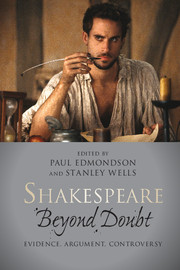Book contents
- Frontmatter
- Content
- List of illustrations
- List of contributors
- General introduction
- Part I Sceptics
- Part II Shakespeare as author
- 6 Theorizing Shakespeare's authorship
- 7 Allusions to Shakespeare to 1642
- 8 Shakespeare as collaborator
- 9 Authorship and the evidence of stylometrics
- 10 What does textual evidence reveal about the author?
- 11 Shakespeare and Warwickshire
- 12 Shakespeare and school
- 13 Shakespeare tells lies
- Part III A cultural phenomenon: Did Shakespeare write Shakespeare?
- Afterword
- A selected reading list
- Notes
- Index
9 - Authorship and the evidence of stylometrics
from Part II - Shakespeare as author
Published online by Cambridge University Press: 05 April 2013
- Frontmatter
- Content
- List of illustrations
- List of contributors
- General introduction
- Part I Sceptics
- Part II Shakespeare as author
- 6 Theorizing Shakespeare's authorship
- 7 Allusions to Shakespeare to 1642
- 8 Shakespeare as collaborator
- 9 Authorship and the evidence of stylometrics
- 10 What does textual evidence reveal about the author?
- 11 Shakespeare and Warwickshire
- 12 Shakespeare and school
- 13 Shakespeare tells lies
- Part III A cultural phenomenon: Did Shakespeare write Shakespeare?
- Afterword
- A selected reading list
- Notes
- Index
Summary
Shakespeare is widely held to be the greatest writer in English. There must therefore be such a thing as literary value upon which agreement can be reached, and the best of those works attributed to Shakespeare must possess qualities that distinguish them from the works of other dramatists and poets. This is demonstrably the case. Most of Shakespeare's plays are mainly in verse, and his poetic style differs from that of each of the several playwrights who at times collaborated with him. It tends also to be more complex, concentrated and expressive – to carry a heavier freight of meaning. The poetry enriches the dramatized events in subtle ways. Shakespeare's dramatic verse is unmatched by that of his professional contemporaries. Its remoteness from the amateur compositions of noblemen proposed as ‘the real Shakespeare’ is even greater. This essay aims briefly to indicate the literary critical grounds for such a claim and, more especially, to describe certain kinds of quantitative tests that differentiate Shakespeare's writing from writing by his co-authors and those ‘Shakespeare claimants’ who have left poems or plays for comparison. The terms ‘stylometrics’ or ‘computational stylistics’ refer to this numerical measurement of style.
Scores of candidates have been put forward as sole or partial authors of Shakespeare's œuvre. Many of these have left no poetry or drama under their own names, so that it is impossible to investigate whether creative writing acknowledged to be theirs is stylistically compatible with the writings of the Shakespeare canon. The Claremont Shakespeare Clinic has, however, devised a series of tests that in combination differentiate every extant work of the core Shakespeare canon from a very large number of other early modern poetic and dramatic works, including those by the fifteen full claimants and twenty-two partial claimants for whom relevant material was available. ‘Full’ claimants are alleged to be the true authors behind the Shakespearian nom-de-plume. ‘Partial’ claimants are held to have composed portions of the canonical works and include several men accepted by orthodox scholars as collaborators with Shakespeare.
- Type
- Chapter
- Information
- Shakespeare beyond DoubtEvidence, Argument, Controversy, pp. 100 - 110Publisher: Cambridge University PressPrint publication year: 2013



